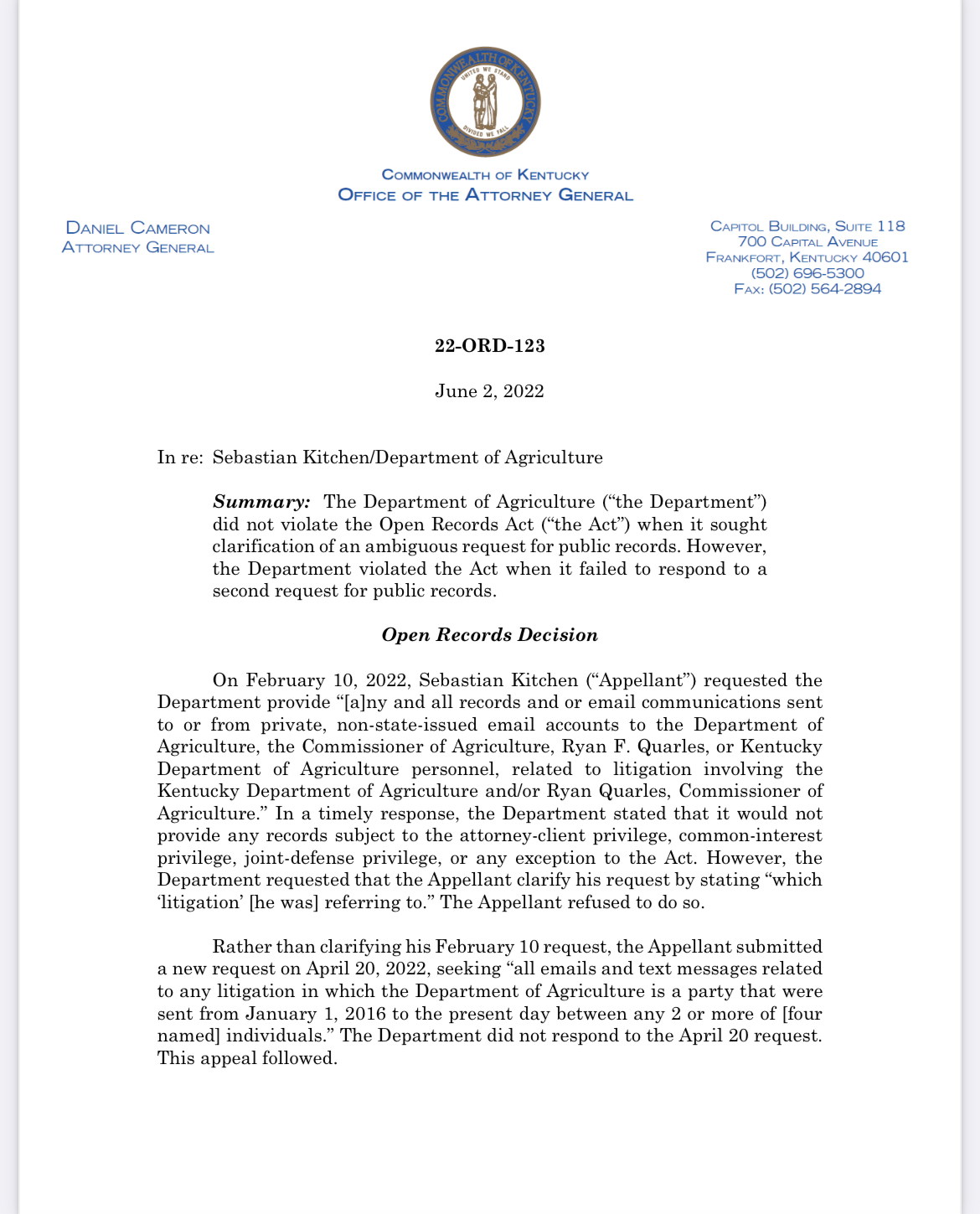
This headline drew national attention: “Records case leads to rare agreement among political rivals.”
https://www.usnews.com/news/best-states/kentucky/articles/2022-06-03/re…
https://www.kansas.com/news/business/article262145857.html
https://www.fresnobee.com/news/business/article262145857.html
On closer inspection, the open records case is a split decision. The attorney general found that neither the requester — who happened to be the executive director of the Kentucky Democratic Party — nor the public agency to which the request was directed — the Department of Agriculture whose commissioner is a Republican candidate for governor — got it entirely right.
https://ag.ky.gov/Resources/orom/2022/22-ORD-123.pdf
The Democratic Party requested “all records and or email communications sent to or from private, non-state-issued email accounts to the Department of Agriculture, the Commissioner of Agriculture, Ryan F. Quarles, or Kentucky Department of Agriculture personnel, related to litigation involving the Kentucky Department of Agriculture and/or Ryan Quarles, Commissioner of Agriculture.” The Department asserted on appeal that — in addition to “at least eight civil lawsuits” in which the Department or the commissioner has been a party — Department “personnel have been named as testifying witnesses (or potential testifying witnesses) in an unknown number of civil lawsuits as well as criminal proceedings.”
The Office of the Attorney General determined that the “ambigu[ity] as to which records the [requester] sought ‘related to litigation involving’ the Department” warranted the Department’s request for clarification, and held that the Department “did not violate the Act when it sought a clarification of the ambiguities” in the Democratic Party’s first request.
(The Kentucky Open Government Coalition examined this and other issues posed by the dispute when the Democratic Party issued a press release about the open records appeal on May 5. We recommended that the appeal be assigned to a merit staffer.
https://kyopengov.org/blog/can-daniel-cameron-objectively-bridge-these-… )
The Office of the Attorney General did, however, find that the Department violated the Act when it failed to respond to the Democratic Party’s subsequent request for “all emails and text messages related to any litigation in which the Department of Agriculture is a party that were sent from January 1, 2016 to the present day between any 2 or more of [four named] individuals.”
“Under the Act,” the OAG explained, “a public agency that receives a request to inspect records ‘shall determine within five [business days] whether to comply with the request and shall notify in writing the person making the request, within the five (5) day period, of its decision.’ KRS 61.880(1).”
Accordingly, neither the Democratic Party nor the Department of Agriculture was entirely right and neither was entirely wrong.
What the OAG did — or, should we say, the OAG merit staffer who reviewed this open records appeal did with great facility — was approach this dispute dispassionately and without reference to the political landscape from which it emerged. He sensibly resolved the appeal on procedural grounds, concluding that the Department did not violate the open records law in requesting clarification of what was, in the first instance, an ambiguous request, but violated the open records law in failing to respond to the Democratic Party’s second request.
Neither party to the appeal is “vindicated,” and neither has grounds for celebration or recrimination.
This is precisely as it should be. Open records or open meetings dispute mediation should never be colored by politics though it exists, by statute, in a political office.
Three important lessons can be drawn from this national headline-making story:
• a records requester’s identity and purpose are irrelevant;
• a public agency must respond to all records requests;
• attorneys general would do well to trust in the knowledge and objectivity of merit staff.
Politics has no place in the attorney general’s role as open records and open meetings dispute mediator.



